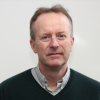
Professor Edward J Briscoe
Fellow
At Girton we admit a small number of undergraduate computer science students per year who all join our wider computer science community. We actively encourage the pursuit of broader interests in the subject and as such the community meets at least twice per term for informal group sessions. These extracurricular sessions create a stronger sense of community and sometimes include visits from guest speakers, practical sessions, workshops or simply getting together to discuss how the course is going.
The main Girton facilities are just a short 10 minute cycle ride from the West Cambridge Site, which houses the Department of Computer Science and Technology, also known as the Computer Laboratory. The Computer Lab is where most of our lectures from world-class experts are held. Students also benefit from regular supervisions which are the small group teaching sessions organised by the colleges in addition to our extracurricular group sessions.
Girton is passionate about high quality teaching and education and an example of this is that our Director of Studies has worked on educational research projects such as AdaComputerScience.org and isaacphysics.org.
The Cambridge Computer Science Tripos enables students to explore a broad range of topics including algorithms, digital electronics, computer graphics, machine learning and software engineering. The course is highly distinguished on the world stage thanks to the breadth of topics covered as well as the depth of learning provided by the college supervision system.
The Department’s undergraduate admissions website contains lots of information on the benefits of studying Computer Science at Cambridge, the course content as well as employment prospects.
Computer Science graduates are in very high demand since the skills we teach are so far reaching and transferable. An example of the high demand can be seen by the annual recruitment fair held at the Computer Laboratory. This attracts a large number of companies, from the well-known (Amazon, Facebook, Google and Microsoft), to the less well-known, including software houses, games developers, and financial institutions. The number of graduate vacancies which employers aim to fill at this event is typically more than 5 times the number of Computer Science students. One hundred per cent of our graduates are employed with a graduate level job six months after graduation, and will often have had several offers.
A surprisingly large number of our graduates go on to start their own companies (and we’ll teach you how to do that too!)